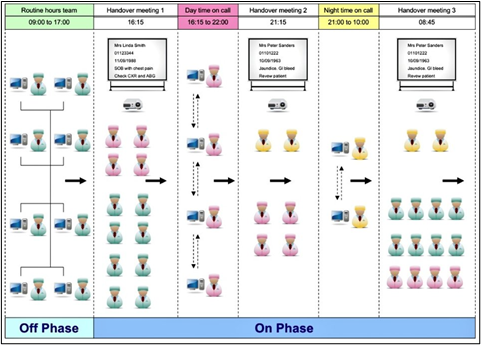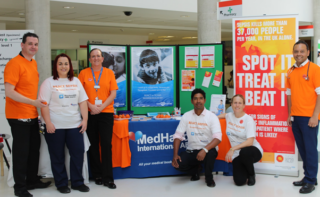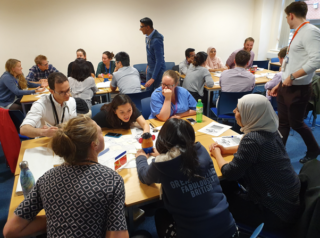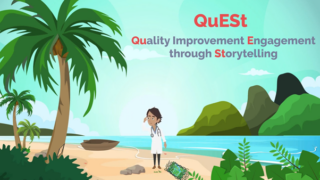How did you first get involved in improvement, and what has been your journey since then?
I observed an acute medical handover meeting in our Medical Assessment Unit at BHRUT in 2009. There were just two managers and two doctors at the meeting and no obvious chair, it all felt rather unstructured and without purpose.
The managers said there was limited engagement from clinicians and the meeting felt like a ‘tick box’ exercise. I started talking to the doctors, nurses and wider teams, and we mapped out the whole handover process and piloted a number of ‘changes ideas’. These included adding a senior clinician to the meeting, an itemised schedule, and a morning educational element. We collected data:
- Was a senior clinician present?
- Did sick patients get discussed?
- Was the meeting proforma used?
There was an over-reliance on paper with limited audit trail so we developed a bespoke eHandover system that managed inpatient, handovers and acute care. The eHandover system aligned to the clinical workflow of medical shift-work.

eHandover was partnered by an IT company through NHS innovations, was scaled and purchased by other trusts and won two national patient safety awards. But it was the trainee engagement that was most pleasing. It was their design and felt it belonged to them. In 2010, the trainee doctors rated handover in the trust as highest across London trusts in the annual GMC survey. The previous year we were nineteenth!
My first formal role in improvement was when I was BHRUT Sepsis Lead in 2015. I was involved in a pan-London UCL Partners Quality Improvement (QI) collaborative to improve Sepsis outcomes. All 14 trusts met every three months to discuss their improvement storyboards. The use of a QI collaborative is a really engaging way to do large scale improvement work. Collaboratives certainly help to improve outcomes, but also support QI learner development through ‘All share, all Learn’.

My focus then turned to medical education, supporting improvement work for new doctors via mentorship. I learnt that improvement work needs to be a multi-disciplinary team sport. It is also a great way to break down hierarchical barriers as everyone is working towards a shared goal. Some went on to publish their work on BMJ Open Quality free of charge, a nice perk of Q membership! To find out more about publishing on BMJ Open Quality, read my previous blog post.
As Clinical Director for QI at UHDB, we are currently developing a quality management system for our medicine division. So it was great to hear about the Q community events on developing health care Quality Management Systems and to see all the great discussion on #QcomQMS on Twitter.
I really enjoy the training side of things and have facilitated many face to face and virtual workshops. I am also a Kata Improvement Coach and hopefully soon will be a QSIR associate.

What most inspires you professionally?
Being a Respiratory Physician and caring for patients, having a QI role and being involved in Medical Education means it keeps things fresh and exciting.
My current role focuses on how to engage newly qualified doctors in improvement work at acute healthcare trusts. Trainee doctors often have limited time in specialties and may end up doing short term QI projects that are unsustainable. I am working with the Royal College of Physicians (RCP) to help ‘Reframe QI’ for Physicians in training. We aim to publish a positional statement shortly with support of John Dean, RCP QI Clinical Lead. I’ve discussed this in more detail on Twitter.
Can you share a hard-won lesson you’ve learnt about what makes for a successful (or unsuccessful) improvement project?
Here are a few:
- Collect as few measures as you can get away with, but do it often.
- Remember that PDSA (Plan-Do-Study-Act) is a multi-disciplinary team sport.
- Do PDSA properly, not just the Do and Act components, and make sure to record them.
- You don’t need to lead improvement work to make your contribution meaningful.
- You have two roles as an improvement mentor/coach; help learner to achieve outcome and help learner get better at improving.
What change could we make that would do most to embed continuous improvement in health and care?
A broad question with a number of possible answers. I am currently completing my final year of an MSc Thesis in Medical Education. The title for the primary research is:
“In what ways does the social learning environment influence how trainee doctors engage with continuous improvement?”
I will be writing a summary piece for the Q community once it is done, which you will be able to read on the Q website.
Why did you join Q?
I joined the Q community to see who else was out there in the world of improvement. It has been a really helpful avenue to connect with people.
I enjoyed posting on the Q community blog and have taken advantage of the free publication offer for BMJ Open Quality. There have been a number of Q community courses that I have attended via the website. As an associate editor for BMJ Open Quality, it is also a helpful repository to find potential reviewers.
What new connections have you made as a result of joining the Q community – and what have you learnt so far?
I have continued to develop my Q community connections through social media and connecting through the Twitter hashtag, #QITwitter. There is an identity as an improver between Q members irrespective of their role, position or what they are striving to improve. A sense that this may be somebody who is approachable, likes to collaborate and has a ‘growth mindset’. Also, you don’t have to look too far to find an expert in improvement in a given field or specialty for advice.
Can you tell us about something you’re currently working on that Q members might be able to get involved with?
Much of the instructional literature on how to improve focuses on the tools without giving the lived experience of improvement. Resources can also be a tad boring, which is a shame, as improvement is anything but boring!
I have been working with Tom Rollinson and John Dean to develop a series of animations to teach concepts around QI through an exciting story-telling island advent

ure. We submitted this as a proposal for this year’s Q Exchange and welcome the community’s thoughts and advice that could help us further develop the project. We have also created a taster video that’s available to watch.
We also host a website for improvement learning animation videos, created in our spare time during the pandemic. We continue to PDSA the resources despite our busy day jobs.
Please link up and offer your thoughts on anything mentioned in this blog. I would love to hear from you!